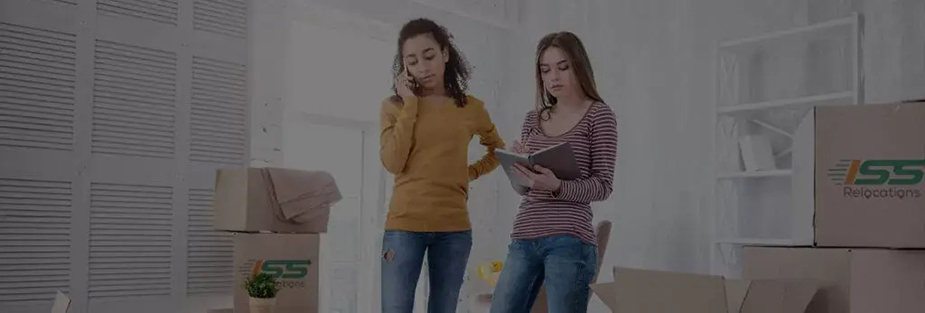
Home Moving Checklist in 2024
Complete guide to moving an entire household:
If you are moving in the current times, it could be challenging organizing the move if you don’t have everything sorted 1-2 months before the move date.
Below you will find step by step guidelines which would help you plan and facilitate a move in a stress-free manner for yourself and your family. As long as everything is planned well in advance, you will have a smooth and headache-free relocation.
Let us help you out here in understanding these guidelines.
We have an in-depth guide to the checklist, which will ease the moving process and help you throughout the moving process.
45 to 60 days before the move date:
During the 45 to 60 days period before the move date, there will be a few personnel or administration related tasks you need to complete before vacating the premises.
If you are residing on a lease/rented accommodation, make sure you have given your landlord/building owners sufficient notice, using the proper process as stated in your rental/lease contract.
Keep in mind the minimum notice period clause as that must be abided to avoid any rental penalty by the building owners.
Do thorough research of the new locality you are moving into and check for basic amenities in the neighbourhood such as hospitals, schools, parks, malls, police stations etc.
You can begin by marking the items in your residence that you do not need for moving and start to sell them 1-2 months in advance or give them away as and when required before the relocating date.
Start to inform your internet/mobile/electricity vendors of the moving out date for an accurate billing period and disconnection of the above equipment before or after loading.
Begin to inform all relevant parties who need a min 30 day notice period who could have pending bills and invoices to be paid at your end.
If you have empty packing material, start sorting out items and place them aside for final segregation before the move, should you still choose to leave aside a few more things depending on the usage of those at the destination country.
30 to 35 days before the move date:
30 to 35 days before the move, you need to have finalized the balance steps of the moving out process and should clearly understand the pending tasks to be completed in this period.
Start to contact the moving forms which are well known and professionals in your area of residence.
Ideally, they should be affiliated with some moving bodies and should have excellent feedback on the internet; hence, start researching this and finalize 3 to 5 moving firms you wish to contact and take this process further.
Invite the moving firm to your residence to come and ascertain the volume to be packed and shipped.
Compares the quotes and see which firm has offered the complete inclusions and minimum exclusions.
Make sure to discuss your requirements over email with the moving firm to record what has been discussed and agreed to.
On the side, contact the local district office or local council for your residence registration in advance.
Make sure to check for transit insurance for your shipment, and it is ideal to go for full comprehensive coverage through the door to door process of your household goods shipment process.
Start to sort out the garage and garden area to make sure you don’t have a pile of items to be handled in the final phase of the move out process.
Make your inventory to check all items and take pictures to know the condition of those items before packing.
Register your new residence with the local council and inform them of your Moving in dates.
Make sure to have labelled all the items that need to move in the bedroom wisely. The moving company packs and loads the items correctly, which will help the destination moving company unload and unpack the items in an orderly manner.
10-14 days before the move:
Packing will commence soon, and at this point, you should be aware of what items need to be shipped, discarded and given away.
Make sure to purchase as few as perusable items you are sure will be consumed by the move date to avoid any wastage. Try to keep some heat and serve food packets handy, as that does help in the last few days of moving.
If you have kids or pets at home and have to leave the residence for a few hours to finish some work, contact a pet handler and caretaker for the kids to look after them in your absence.
Please send an email and contact the local schools and housing council making them aware of your arrival dates with the family.
Please register for the GP in your new area and send copies of your children’s school records to their new school.
Request for off days from work during the moving process and chart a schedule for the last 7-10 days of the balance tasks to be completed.
If you are not able to decide if the items to be moved will fit into the new premises or not, try taking storage rates closer to the new address to keep this as a last resort option to store the items that do not fit into the new premises.
You should have completed about 80% of the tasks required before the move date.
7 days before the move date:
The guidelines below should be considered as time is critical, and all your plans and tasks should be completed smoothly without any hassles.
Re-Confirm the exact date and time of the crew’s arrival with your moving company and provide them with any further directions if they need them.
Finish your self-pack contents and make a contingency bag full of essentials you may need before the move date.
Start sorting things the final time you don’t need and discard or give them away to have less clutter on the move date. Arrange for new locks at the new address and make sure to have the old new house 100% pest controlled before moving.
Make sure to arrange for adequate food and water supplies you will need on the day of moving into the new home, and look for online grocery store deliveries or nearby supermarkets to fulfil this requirement.
1-3 days before the move date:
Sort out the clothing which you need immediately and keep them aside. Finish laundry to avoid dirty clothes in the last phase of the moving out process.
Label any spare keys and rename the new keys for the premises.
Remember to contact via email or telephone the local municipality post office etc., and other utility companies where you will need to out in a request for disconnection of electricity, gas, water, internet, telephone, etc., on the day of moving.
This should be done 1-3 days before the move out date to have sufficient time to plan it more efficiently.
Remember to properly disconnect all appliances that are a part of the moving shipment, such as fridge, gas cooker, dishwasher, washing machine etc.
It is essential to remember to discard/throw away any trash or leftover food that has already expired.
Lastly, carefully empty and remember to defrost your fridge/freezer/cold storage units and give away nonperishable /perishable food that is not needed anymore.
On the day of Moving:
Finally, the time has to move out of the property as the new residence is waiting for you. Have a look at some of the critical points below which could help during the move.
Speak to the moving supervisor and explain the main points you want to consider before moving out.
Ensure a final walkthrough is done at the old premises before locking the home with the moving supervisor.
Check all wardrobes, kitchen cabinets, living room, kids area and garden/garage for anything that has not been packed and needs to go to the new premises.
Do one last check of your home before leaving it, after everything has been packed into your moving van.
Go through all the drawers and cupboards in every room and check the garage if you have one.
Remember to make sure all windows and doors are locked and secured, and note all meter readings.
Click pictures or take videos of the vacated property as proof of the property condition before leaving the house.
Once you have successfully entered your new residence, remember to return the keys to your old property to the relevant party, check if your utilities are working and conduct a final walkthrough of the vans being emptied.
Some more essential points for the moving day:
Make sure to have completed the below steps to ensure nothing has been left behind or not completed.
Keep all documents such as passports, birth certificates, licenses, bank statements, and chequebooks close to yourself in a bag which won’t get lost.
Medicines, mobile phone and laptop chargers, jewellery, watches, keys to the new residence, cash/cheque books, essential water and eating supplies, children’s clothes/toys etc., toolbox if you need any small fixings etc.
As you prepare for your move, it’s important to stay informed about industry shifts. Recent legal changes in the home buying and selling process may significantly affect how real estate transactions are handled.
Moving into a new house checklist is essential before stepping into the new premises.
Let us discuss a few important points related to this last-minute checklist:
Make sure to inform the relevant parties before moving into the new home as it is vital they are aware of the new address: These are as follows:
- Current employer
- Health insurance firm
- Local municipality or council
- Local service providers for internet, telephone, electricity and water
- Post office and regional transport authority
- Banks and post offices
- Any other local registered office for official authorization
If all these steps are considered, a moving process can be simplified and made stress free for yourself and your family.
When you move into new premises, you should first click pictures of the items before offloading to make sure the things have not toppled or fallen into the truck while in transit.
Once you enter the new premises, check all the plug points, utilities, etc. and if they are working in order.
Once you have checked all these, the good should be offloaded and bought inside the new premises followed by unpacking and set up.
- An average one-bedroom home can be packed in 4 to 8 working hours and unpacked in 2-3 hours.
- An average two-bedroom home can be packed in 6 to 10 working hours and unpacked in 2-5 hours.
- An average three-bedroom home can be packed in 8 to 14 working hours and unpacked in 3 to 7 working hours.
- An average 4-5 bedroom home can be packed in 18 to 24 working hours and unpacked in 4 to 10 working hours.
By now you would have figured out if all the items have fit into the new premises or not. If not, transport the balance items into the storage unit you must have spoken to before the move and let them take care of your stored belongings.
Check the storage insurance clause with them and take the steps necessary to cover yourself from any unforeseen circumstances.
At last, your moving process has been completed, and by now, you must have felt a relief to see the whole process happen for you without much stress and anxiety.
We wish you a wonderful stay at your new HOME! Cheers !!!
Plan Stress-free Move with Top Moving Company in UAE - ISS Relocations

Frequently Asked Questions
What to pack 2 weeks before moving?
Two weeks before moving, start packing items you rarely use, such as seasonal clothes, decor, and non-essential kitchenware. Begin organizing important documents and making sure all your paperwork is in order for your move. ISS Relocations offers professional packing services, helping you pack efficiently and ensuring your belongings are properly protected for transport to your new home.
How to move a house step by step?
To move a house step by step, start by decluttering, creating an inventory list, and organizing your belongings. Begin packing non-essential items first, and as the move day approaches, pack essential items last. ISS Relocations provides a comprehensive moving service, offering expert advice and assistance at every stage, ensuring a smooth, stress-free move to your new home.
What to do 6 months before moving?
Six months before moving, start planning your move by researching moving companies, organizing important documents, and determining your budget. Begin decluttering your home, and create a timeline for the move. ISS Relocations offers pre-move consultations to guide you through the process, ensuring everything is on track and organized for a seamless relocation.
What to pack first when moving to UAE?
When moving to the UAE, start by packing non-essential items such as books, seasonal clothing, and decorative items. You can also begin organizing important documents, medical records, and personal belongings. ISS Relocations provides expert packing and relocation services to help you get organized and ensure your belongings are safely transported to your new home in the UAE.
Why use a moving checklist?
A moving checklist helps keep the entire moving process organized and ensures nothing is forgotten. It outlines tasks, from packing and labeling to hiring moving companies and completing paperwork. ISS Relocations provides moving checklists and expert assistance, ensuring your move is efficient and well-planned, making the process stress-free.
Why do people move home to Dubai?
People move to Dubai for various reasons, such as career opportunities, lifestyle improvements, business prospects, or a change in environment. ISS Relocations helps make relocating to Dubai easy by providing reliable moving services, offering end-to-end support for a seamless transition to your new home.
How to make a pros and cons list for moving?
To make a pros and cons list for moving, consider factors like job opportunities, cost of living, lifestyle, family needs, and long-term goals. Write down the benefits and challenges of moving to your new location. ISS Relocations can assist by providing expert relocation services and offering guidance through your decision-making process, ensuring that your move is the best choice for you.
Moving Company - Recent Blog
Stay informed and prepared for your next move with our latest blogs on moving services in the UAE. From expert packing tips to international relocation guides, ISS Relocations brings you up-to-date insights to make your moving experience smoother, safer, and stress-free.










